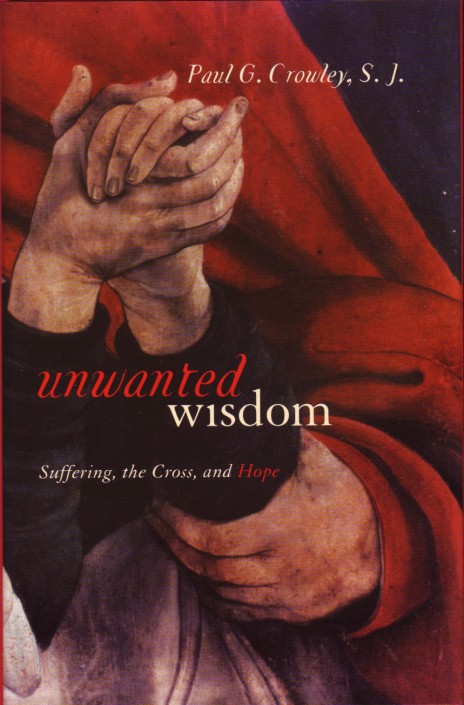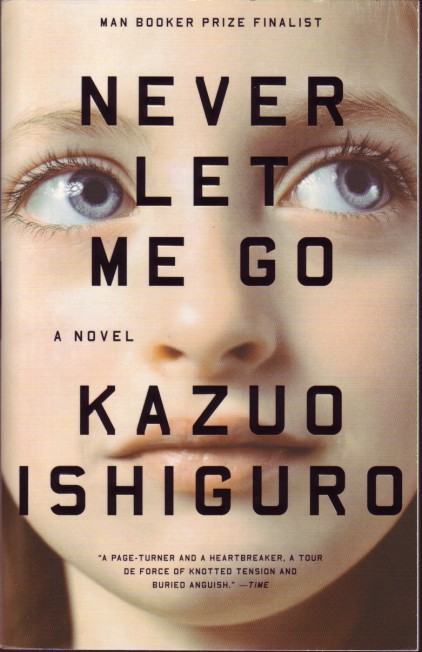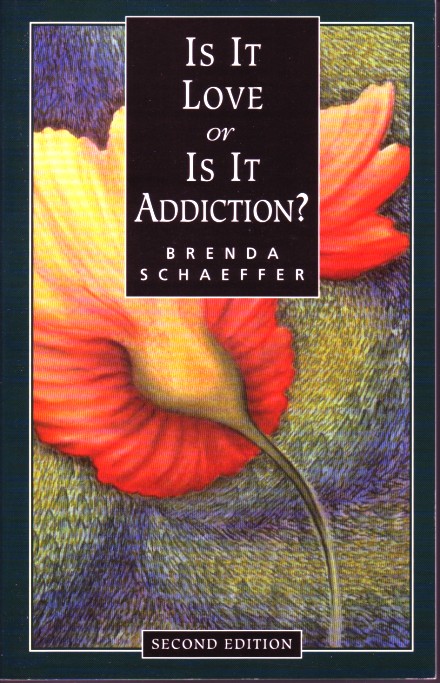Reading list
Update: added two excerpts to the first book.
Picked up a couple of books at the campus bookstore after Mass today:
Unwanted Wisdom: Suffering, the Cross, and Hope

The film, "The Passion of the Christ," raised anew the question: why did Jesus suffer such an excruciatingly painful death? For centuries, those afflicted with suffering have been counseled by the church to unite their sufferings to those of Jesus. This book asks the question how the cross of Jesus can be reimagined in such a way as to offer a path of hope rather than resignation. Drawing upon resources as diverse as Simone Weil, William Lynch, Dorothee Soelle, Karl Rahner, and Jon Sobrino, as well as the author’s personal experience of deep loss, the book explores the terrain of suffering, from the universal pain brought about by the loss of loved ones to the exceedingly indivdual imprisonment of mental illness and the global catastrophe of AIDS. The book also questions the extra burden of suffering put upon gay Catholics by the church’s teaching of life-long celibacy for homosexuals. Inspirational, intelligent, and globally informed, Unwanted Wisdom sends out a message of hope to all Catholics who've yearned to apply the wisdom of Jesus to their own personal suffering.
Professor Crowley is the chair of the Religious Studies department at Santa Clara University. I read medieval and renaissance religion under him. During that time, Father Crowley also became a spiritual advisor to me.
In reading this book, I hope to find the answers--or, failing at that, at least some direction--to the following questions:
What is the nature of grief?
Why is there sorrow in this world?
The heart seeks comfort, but the mind must be fostered too.
Two excerpts
Does the suffering that attends life in fact have any meaning, or is life itself simply a string of meaningless happenings, a final absurdity? And where is God in all this? Present? Absent? Wringing his hands? Does God even care? And, perhaps the most persistent question for me: Why the Cross? Not only what is the meaning of all this suffering that besets the human race, but why does this suffering, symbolized by the Cross, apparently lie at the heart of the Christian faith and its imagination? How can one possibly hope for a better future, or a future in a loving God, in the face of so much darkness--suffering compounding suffering, an endless chronicle of it? What would it mean to hope to believe in a resurrection from the dead--a triumph over and release from all of this?
[ . . . ]
There are times when the suffering that attends tragic reversal, both in one's own life or in the lives of others, forces upon us a wisdom that is not asked for, not even wanted. But that very wisdom can become a key to a joyful freedom, where one discovers all of a sudden, as if awakened from a long trance, that what once seemed very important simply no longer has any power over us. What ultimately matters, instead, is the joy that one discovers, as Francis did, when he kissed the leper, and the joy the leper discovered when, against all earthly hope, he was finally set free. In Messiaen's opera, the leper springs into a wondrous dance of joy. In the final analysis, we are, each and all of us, lepers--waiting to be kissed, yearning to dance with joy. God's accomplishment of this in us, entering into and working through our sorrows and sufferings, is the gift of what Ignatius called the "Contemplatio," the hope of faith fulfilled, not by us, but by God. Precisely by living in and going through our sufferings, we can in fact enter into joy--perhaps a quiet joy, but nevertheless real. The final hope of Christian faith is that this reality, the reality of joy born of suffering, may become good news for all the suffering world. (bold face mine 146-7)
I am attempting here an essay that combines the passion of personal experience with reflection upon the cross in some parts of the Christian theological tradition. [ . . . ] The goal is to arrive at a theologically grounded sense of hope in the face of suffering. This is a theology that hovers, as it were, at the intersection between speculation and spirituality, between the questioning of the mind and the yearnings of the heart. It is of personal provenance, but seeks to reach out to the suffering of others and ask not simply what Christian doctrine has to say about it, but how Christian imagination can function to help us meet the darkness of suffering in human existence.
[ . . . ]
In theological terms, I understand hope to be a theological virtue, a practice of faith the origins of which like in God's own self-gift, and the endpoint of which is participation in divine life. How, then, can people of faith arrive at a lived sense of hope within present moments of suffering, marked as these moments often are by a sense of hopelessness? The theological virtue of hope cannot simply be conjured up; it is not some heroic mustering of a "hope against hope." A hope against hope may simply be an act of desperation, or even a denial of what is the case about human life as we find it--a kind of Stoic resignation, or worse, a refusal to acknowledge what is real. Christian faith does not counsel such a form of hope. In the extreme, hoping against hope may become an expression of despair.
On the other hand, Christian faith does indeed recognize that life can be grim, and that the promises of God in Christ can seem very remote from life as we know it. The problem for Christian faith, then, becomes how to move from hope as promise to hope as living and realized gift, and doing this without indulging in either fantasy or idealism.
[ . . . ]
In the end, relying on Jon Sobrino's Ignatian-inspired theology, I propose a spirituality of the cross that includes three major moments: the relationship of the cross to the entire paschal mystery (including the enfleshment of the divine); the cross as an utterly real symbol--a symbol of the reality of suffering that cumulates in death; and the cross as symbol of hope. In the concrete, this hope is realized in living a faith where, in Sobrino's memorable image, people take one another down from their crosses of suffering. This solidarity is the historical realization of the promise of the resurrection itself. Such an eschatology offers a vision of God's future that is already being realized, for in mutual solidarity, human beings find themselves already rising, already being raised by God in the "practice" of resurrection. The path to joy through suffering of the cross is found by embracing those who suffer, going through it with them, and moving together toward the horizon of God. (bold face mine 10-6)
Never Let Me Go

From the Booker Prize-winning author of The Remains of the Day comes a devastating new novel of innocence, knowledge, and loss. As children Kathy, Ruth, and Tommy were students at Hailsham, an exclusive boarding school secluded in the English countryside. It was a place of mercurial cliques and mysterious rules where teachers were constantly reminding their charges of how special they were.
Now, years later, Kathy is a young woman. Ruth and Tommy have reentered her life. And for the first time she is beginning to look back at their shared past and understand just what it is that makes them special–and how that gift will shape the rest of their time together. Suspenseful, moving, beautifully atmospheric, Never Let Me Go is another classic by the author of The Remains of the Day
The wordsmith, Kazuo Ishiguro, needs no introduction. Those who cannot spare the time to read his earlier novel, The Remains of the Day, may choose to watch the *ahem!* fatally truncated movie adaptation. Nonetheless, Anthony Hopkins pulls off a terrific job as the repressed-but-always-dignified butler, Stevens: "our professional duty is not to our own foibles and sentiments, but to the wishes of our employer." Palpably tragic in its subtlety. If you want to know what regret means, read this book.
Picked up the following book from the Jesuit Retreat Center last week, and it has been an illuminating, albeit at times unbearably painful, read:
Is It Love or Is It Addiction?

Relationships that continue despite pain, emotional chaos, and disruptive impulsivity are addictive, says Brenda Schaeffer, a psychotherapist who knows her stuff and provides an excellent primer on the subject of love and love addiction. Especially if there is past loss or trauma, the resulting pain can make us uncontrollably attached to anyone who soothes that pain, even when this creates many other problems. Healthy love helps us expand ourselves and learn higher growth processes; the addictive attachment only distracts, stagnates, and frustrates personal development. . . . Is It Love or Is It Addiction? has helped many people find their way from the fear and distrust in poor relationships to the fulfillment in meaningful ones. Psychotherapist Brenda Schaeffer draws on common sense, compassion, and years of experience to provide tools for moving from addictive to healthy love.
An excerpt
Love relationships can be good or bad, depending on how they serve us. The questions we consider here are these: Does love addiction really exist? What is love addiction? How does love become addictive? How can something so wonderful become something that feels so bad? Is it love? Or, is it addiction? What is a healthy relationship?
My clinical experience of love addiction is that it is a reliance on someone external to the self in an attempt to get unmet needs fulfilled, avoid fear or emotional pain, solve problems, and maintain balance. The paradox is that love addiction is an attempt to gain control of our lives, and in so doing, we go out of control by giving personal power to someone other than ourselves. This attempt, then, results in an unhealthy dependency on others. It is very often associated with feelings of "never having enough" or "not being enough." This is because many of us did not get all of our needs met in an orderly way when we were children. Addictive love is an attempt to satisfy our developmental hunger for security, sensation, power, belonging, and meaning. Love addiction is also a form of passivity in that we do not directly resolve our own problems but attempt to collude with others so they will take care of us and thus take care of our problems. We willingly take care of others at our own emotional expense, or we attempt to control them to meet our needs at their expense. No matter how it plays out, we look to others to "fix" our fear, pain, and discomfort, and we tolerate or inflict abusive behaviors in the process. These others can include any important person in our lives with whom we (often unconsciously) hook up: a child, a parent, a friend, a boss, a spouse, a lover. Or, as in romance or sexual compulsion, it can be someone we don't even know personally. A key element of the unhealthy aspect of the relationship is how we feel when that person disapproves of us, disagrees with us, moves away from us, or threatens us. An escalation in dysfunctional behavior will no doubt occur when the love object leaves or threatens to leave us.
Love addiction may or may not include a romantic or sexual component. When the object of love is, or as been, the romantic partner, the stakes run high. What we witness daily in the news confirms that the more extreme cases of sex, love, and romance addiction can be lethal. Homicide, suicide, stalking, rape, incest, AIDS, and domestic violence capture the headlines. Love addiction can range from an unhealthy dependency sanctioned by society to violence and abuse abhorred, but never-the-less promulgated by, the same society. It is important to know that these are but degrees of the same problem.
[ . . . ]
The psychological seeds of dependent love, romance, and sex addiction are sown in early life when we experience overt and covert abuse from those we love. What starts out as healthy dependency becomes unhealthy. The roots of dependent love, romance, and sexual addiction are similar, and often overlap, but the addiction processes of each are unique.
[ . . . ]
Dependent Love
As a psychotherapist, I am acutely aware of how often my clients' adult love relationships exist in the shadow of early love experiences--especially childhood ties to parents.
[ . . . ]
Love and the Unconscious Mind
[Some] cases are sometimes referred to as examples of emotional incest. Over and over again, a child is invited to take care of the parents' feelings. Sometimes the invitation is overt, sometimes it is covert. The child often misconstrues this silent seduction as parental love. When the invitation comes from from the parent of the opposite sex, it is covert incest. The parent asks the child to be the surrogate partner. Such partnerships set the child up for a role reversal that later translates into dependent love relationships and confusion about the nature of real intimacy.
Behind each obsessive, often destructive, relationship--which we shall call addictive love--lurks a belief that such dependence serves an important purpose. To the unconscious mind, addictive love makes perfect sense; it feels necessary to survival itself. And to an addictive lover, even a pathological relationship may seem normal and necessary. As we understand our fears and the ways we use addictive love, they often lose their holding power.
[ . . . ]
Addictive lovers labor under the illusion that the dependent relationship will "fix" their fears. We will explore the many complex reasons that addictive love exercises a powerful hold over people and why it is not easily given up. [M]any people are drawn into it over and over again. But how do people get drawn into love addiction? The seeds of love addiction lie deep in our biology, our social education, our spiritual quests, and our psychological beliefs[ . . ..]
[E]ach person in an addictive relationship followed an individual road map leading into it. Finding out how love addiction makes sense to its victims is necessary in creating a road map out of love addiction and into mature love and belonging. We return to the puzzle: How does something that feels so good become something that feels so bad?
[ . . . ]
Our primary focus [...] will be on the dependent love relationship. It is dependent love to which the human condition seems to direct most of us most often. It is so common that we frequently fail to recognize it until it wrecks havoc on our love lives. (8-18)
A year before his death, the seriously-ill and persecuted David Herbert Lawrence penned the following poem:
Self-Pity
I never saw a wild thing
sorry for itself.
A small bird will drop frozen dead from a bough
without ever having felt sorry for itself.
(1929)
An admonishment against apathy and despair, if there ever was one.

2 Comments:
-laughs-
Unasked wisdom indeed. When I have some time after my exam, maybe I'll post a fuller explanation of my saga.
Good luck for your bar exam, Anthony.
Know that you are in my prayers.
Post a Comment
<< Home